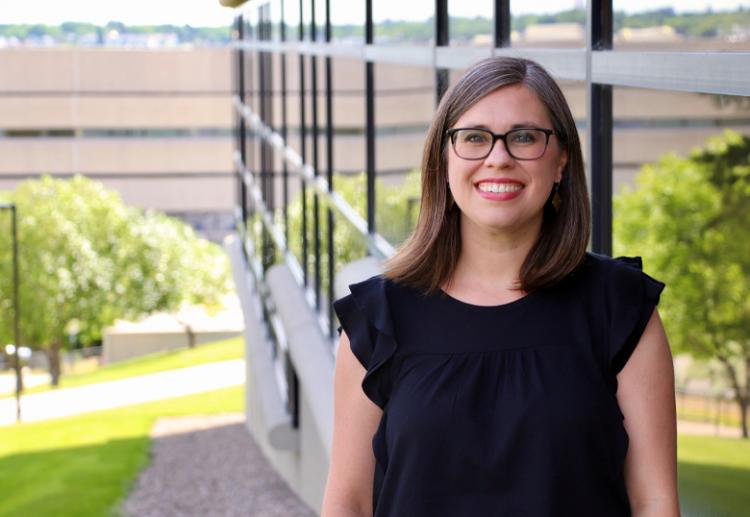Dr. Jennifer Otto, a professor in the Department of Religious Studies at the University of Lethbridge, will go back 500 years to delve into the events that eventually led to modern-day human rights, thanks to a grant from the Social Sciences and Humanities Research Council (SSHRC).

The free church movement had its origins during the Radical Reformation, which began in the 1520s. Groups such as Mennonites, Hutterites and free evangelical or Baptist congregations believed the church should be separate from state institutions.
"This is now a foundation of modern human rights, the idea that people should have freedom of conscience to practice their religious beliefs how they wish without state interference," says Otto. "In the 1520s, this was not the case. In fact, quite the opposite. To step out of the state church was punishable by death."
Wanting to be outside the state church was seen as being disloyal to both the church and the state. It led to a series of judicial persecutions or prosecutions in the court system and the execution of people who had advocated for a separation from the state church. The 1500s were a period of intense religious persecutions on all sides, with protestants persecuting Catholics, Catholics persecuting protestants and both Catholics and protestants persecuting the free-church advocates.
From the 1520s to the beginning of the 17th century, more than 2,000 religious dissenters faced judicial execution in central Europe for the crime of permitting themselves to be rebaptized. These Anabaptists believed they should be baptized as adults because religion should be an individual's free choice rather than something one is born into. The persistent threat of persecution resulted in many early Anabaptist groups developing what has been called a martyrological consciousness.' They saw themselves as reliving the experiences of early Christians.
With the upcoming 500th anniversary of the Radical Reformation, Otto's project, titled Remembering Anabaptist Martyrs, will delve into the concept of martyrdom and how it has evolved over the centuries.
"There's a general interest, I think, in understanding the roots of this idea of religious tolerance and the idea of separation of church and state that really starts in the 1500s," says Otto. "My project is also a broader study of how different minority groups can feel themselves to be outsiders and be persecuted within majority Christian societies. In addition, I'm looking at the concept of martyrdom and how it has evolved over a really long period of time."
Otto plans to examine how Anabaptist martyrs related to early church martyrs, through older martyr literature and their interpretation of their own experiences. She'll also look at how the sense of being part of a martyred tradition has affected Anabaptists over the past 500 years, in terms of their relationship to the larger church and society. Part of the project involves looking at how contemporary Anabaptists or free-church Christians are remembering the 500th anniversary and retelling the stories of the first Anabaptists and martyrs of the 16th century.
In the wake of such events as the Columbine school shooting and the 9-11 terror attacks, scholars who study martyrs and persecution began focusing on the role of the community in determining who qualifies as a martyr. They took a step back, particularly after 9-11, to examine how judgements about martyrs are made and the criteria for defining a legitimate versus an illegitimate martyr.
"It's the community and not the manner of death itself that makes someone a martyr," says Otto. "There is no one stable set of criteria that can be used to define a martyr, rather martyrdom is something that happens through the commemoration. Communities choose their martyrs and remember them as such and it's in that process of remembering and commemoration that a death becomes a martyrdom."
In the 16th century, from the perspective of church and state officials, the Anabaptists were not martyrs they were traitors and potentially dangerous criminals. Thus, one person's martyr is another person's terrorist, whether in the 16th or the 21st century.
"As we enter into a big anniversary like this one, I'd like to know how Catholics, Lutheran and Reformed Christians, and Anabaptists remember these events together, given that we now all live in one multi-religious, multicultural and tolerant society," says Otto. "How do these different perspectives of looking at these same events fit together? How can we share a common memory?"
The grant enables Otto to hire two undergraduate research assistants. In addition, and depending on travel restrictions, Otto plans to visit libraries and other archives in Europe to examine early manuscripts and books. She'll also look at denominational publications over the last century to see how the idea of the martyr develops over time. In the planning stages is a community-focused conference where leaders can discuss the process of remembering, the legacy of the Radical Reformation, the idea of separation of church and state and freedom of conscience. The timing of the conference will depend on COVID restrictions.
The Department of Religious Studies at the U of L is small, with only five faculty members, but mighty. Along with Otto, Drs. Hilary Rodrigues and John Harding hold SSHRC grants.










